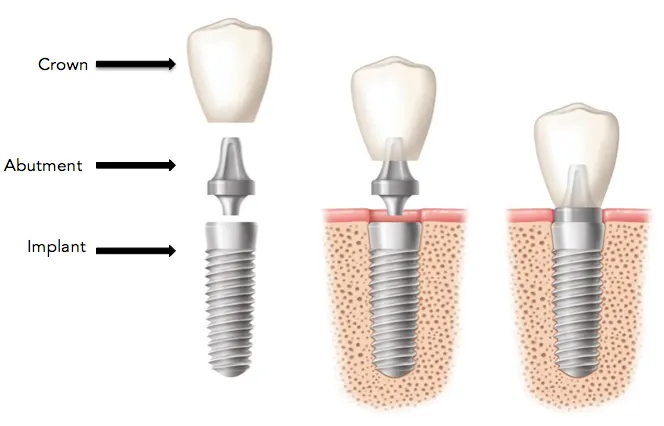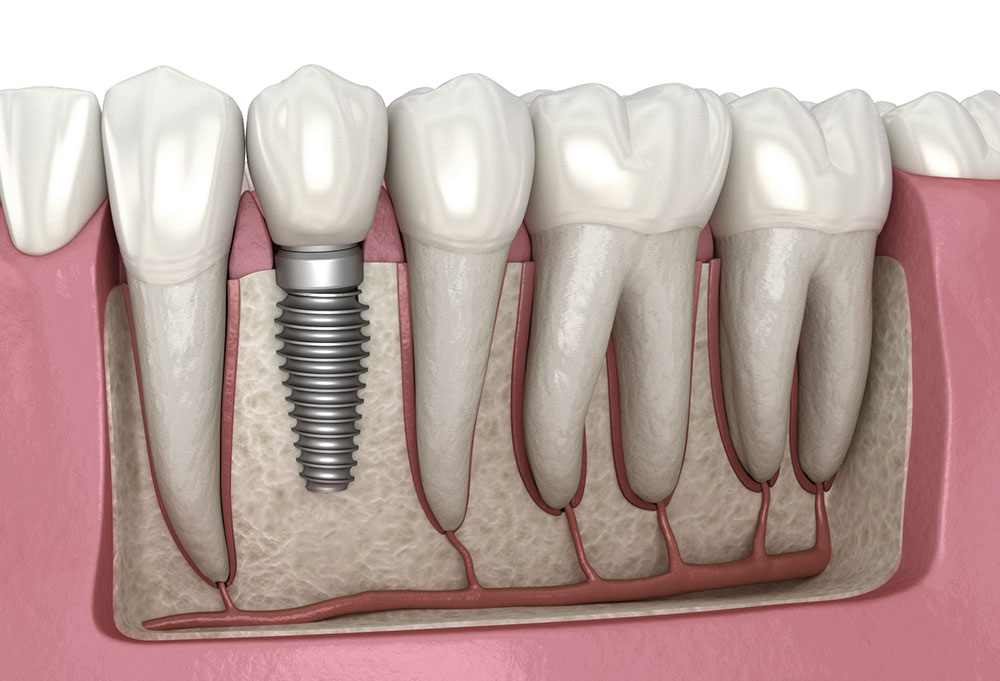“The choice of implant system can impact success and longevity. Reputable brands like Straumann, Nobel Biocare, Osstem, and Zimmer Biomet are renowned for quality, safety, and extensive clinical research. These systems support faster healing, reliable outcomes, and better aesthetics.”
Table of Contents
- Introduction: Modern Solutions for Tooth Loss
- Understanding Dental Implants
- Key Components of a Dental Implant
- The Science Behind Implant Success
- Who Can Receive Dental Implants?
- Advantages of Choosing Dental Implants
- Step-by-Step Guide to the Implant Process
- Types of Implant Treatments
- Comparing Implants, Bridges, and Dentures
- Long-Term Care and Durability
- Possible Risks and How They’re Managed
- Dental Implant Costs: What to Expect
- Frequently Asked Questions
- Conclusion
1. Introduction: Modern Solutions for Tooth Loss
Losing teeth due to injury, decay, or gum disease is a common dental challenge. The consequences go beyond appearance—affecting speech, chewing, and facial structure. Traditional options like bridges or dentures offer solutions, but they may fall short in comfort, longevity, and stability.
Dental implants represent a significant advancement in modern dentistry. As a durable and natural-looking option, implants restore both aesthetics and function by integrating seamlessly with your jawbone. This guide offers clear insight into what implants are, how they work, and who benefits most from them.
2. Understanding Dental Implants
A dental implant is a small, screw-like post crafted from biocompatible titanium. It’s surgically embedded into the jawbone to serve as a replacement tooth root. Once healed, it supports a dental crown, bridge, or denture.
Unlike removable prosthetics, implants behave like natural teeth—helping patients chew confidently, speak clearly, and smile without hesitation.
3. Key Components of a Dental Implant
A typical dental implant system includes:
- Implant Fixture: The titanium post anchored into the jaw, replacing the tooth root.
- Abutment: A connector that links the implant with the restoration.
- Crown/Prosthesis: The visible artificial tooth, customized to resemble your natural teeth in color and contour.

Each component is crucial to the implant’s stability, aesthetics, and function.
4. The Science Behind Implant Success
Dental implants rely on a process called osseointegration, where the jawbone fuses with the titanium surface of the implant. This creates a stable anchor capable of withstanding chewing forces.
This biological bonding process typically takes a few months and is essential for long-term success. The material used, surgical precision, and healing period all contribute to how well the implant integrates.
5. Who Can Receive Dental Implants?
Dental implants are suitable for most adults who:
- Have one or more missing teeth
- Maintain healthy gums and sufficient bone volume
- Are free from uncontrolled systemic illnesses like diabetes
- Do not smoke or are willing to stop during healing
- Practice good oral hygiene and attend regular check-ups
Even patients with reduced bone levels may qualify after procedures like bone grafting or sinus lifts.
6. Advantages of Choosing Dental Implants
Dental implants offer multiple benefits, including:
- Aesthetics: They mimic the appearance of natural teeth.
- Function: They restore complete chewing efficiency.
- Preservation: They help maintain jawbone health.
- Stability: Implants remain firmly in place.
- Durability: They can last for decades with proper care.
- Oral Integrity: No need to trim neighboring teeth as in bridges.
7. Step-by-Step Guide to the Implant Process
The dental implant journey includes several key stages:
- Initial Consultation: A comprehensive exam, including scans, to plan the treatment.
- Surgical Placement: The implant is placed into the jaw under local anesthesia.
- Healing Phase: Osseointegration occurs over 3–6 months.
- Restoration: A crown is fixed on top of the healed implant using an abutment.
The entire process is safe, structured, and guided by clinical precision.
8. Types of Implant Treatments
Implants offer flexible options based on your needs:
- Single Implants: Ideal for one missing tooth.
- Implant Bridges: Replace several missing teeth in a row.
- All-on-4 or All-on-6: Full arch restoration using fewer implants.
- Implant-Retained Dentures: For enhanced stability of removable dentures.
- Zygomatic Implants: Designed for patients with significant bone loss in the upper jaw.
9. Comparing Implants, Bridges, and Dentures
| Feature | Implants | Dentures | Bridges |
| Bone Preservation | ✅ Yes | ❌ No | ❌ No |
| Lifespan | ✅ 20+ years | ❌ 5–7 years | ❌ 5–10 years |
| Comfort & Fit | ✅ High | ❌ Moderate | ✅ Moderate |
| Impact on Nearby Teeth | ✅ None | ✅ None | ❌ Yes |
| Aesthetic Appeal | ✅ Excellent | ❌ Average | ✅ Good |
10. Long-Term Care and Durability
Dental implants can last a lifetime with consistent care. Recommendations include:
- Brushing twice a day with a soft-bristled brush
- Flossing or using a water flosser daily
- Visiting your dentist every six months
- Avoiding tobacco and limiting alcohol
- Wearing a mouthguard if you grind your teeth
Proper maintenance helps ensure the implant remains healthy and functional for years to come.
11. Possible Risks and How They’re Managed
Although implants have a high success rate, potential complications include:
- Site infection
- Nerve damage
- Sinus involvement in upper jaw cases
- Implant failure due to insufficient integration
- Inflammation of surrounding gum tissue (peri-implantitis)
Choosing an experienced dental professional and adhering to aftercare guidelines significantly minimizes these risks.
12. Dental Implant Costs: What to Expect
Costs can vary based on implant type, material, and clinical complexity. Here’s a general overview for Chennai, India:
- Single Implant: ₹20,000 to ₹50,000
- Implant Bridge: ₹6,000 to ₹20,000 per tooth
- All-on-4: ₹1,50,000 to ₹2,50,000
- All-on-6: ₹2,50,000 to ₹7,00,000
While implants may require a higher upfront cost, their long-term durability often makes them more cost-effective than bridges or dentures.
About Implant Brands:
The choice of implant system can impact success and longevity. Reputable brands like Straumann, Nobel Biocare, Osstem, and Zimmer Biomet are renowned for quality, safety, and extensive clinical research. These systems support faster healing, reliable outcomes, and better aesthetics.
13. Frequently Asked Questions
Q: Is the procedure painful?
A: Most patients report minimal discomfort, similar to a standard extraction.
Q: Are implants suitable for seniors?
A: Yes. Age isn’t a limiting factor if the patient is medically fit.
Q: What if there’s not enough bone?
A: Bone grafts or alternative implant types can help in such cases.
Q: How do I care for my implants?
A: Brush, floss, and attend routine check-ups—just like with natural teeth.
14. Conclusion
Dental implants are a state-of-the-art option for replacing missing teeth. They offer unmatched strength, function, and aesthetics, with benefits that extend beyond oral health. When placed by an experienced clinician and cared for properly, implants can offer a lifetime of confident smiles.
🌐 www.4squaresdentistry.in
📞 +91 73052 22044
✉️ admin@4squaresdentistry.in
About The Author
Dr. Aesha Imran Syeda (18+ Years of Clinical Experience)
Founder and Clinical Director, 4 Squares Dentistry

